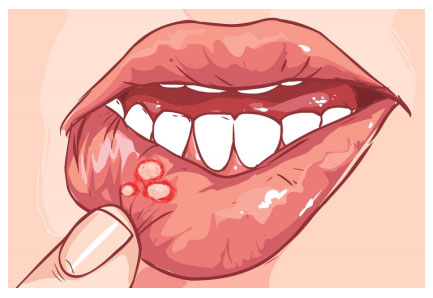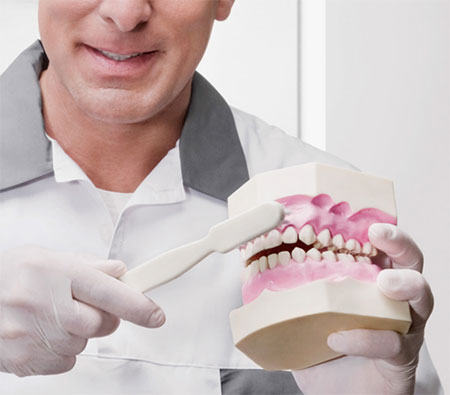Sore mouth and throat occur because the rapidly growing cells in the mucosal lining of the mouth and throat are very sensitive to the effects of chemotherapy and radiation. Painful sores and inflammation can develop in the mouth, including on the tongue, gums, back of the throat and the lips. A sore mouth may be linked with a dry mouth.
Sore mouth may also be called oral mucositis or stomatitis. These terms are often used interchangeably. Mucositis is a general term used to describe an inflammation of the mucous membranes that line the mouth, throat, oesophagus and intestine. It is called oral mucositis when the inflammation is in the mouth. Stomatitis is an inflammation of tissues inside the mouth, including the gums, tongue, cheeks and lips.
The discomfort from a sore mouth can range from mild and easily treated to more severe. A sore mouth can make eating, drinking and swallowing painful. It can be severe enough to interfere with treatment and your ability to maintain good nutrition. Sometimes doses of chemotherapy or radiation may have to be lowered or stopped temporarily. The healthcare team takes steps to check for, prevent and control a sore mouth. A dietician can also suggest ways to cope with a sore mouth and how to maintain nutrition when it affects eating.
Early detection and good management of mouth sores is important to prevent them from worsening and to reduce the risk of treatment discontinuation.
CAUSES
The gastrointestinal (GI) tract includes the mouth, throat, oesophagus and intestines. The GI tract is lined with a mucous membrane. This mucous membrane contains rapidly dividing cells that protect the inside of the body and keep it moist. Sore mouth occurs when cancer treatments damage the rapidly dividing cells and prevent them from reproducing. This makes it difficult for the cells to repair themselves and protect the inside of the mouth and throat. As a result, the body creates an inflammatory response to try to protect itself.
Many chemotherapy drugs can cause a sore mouth. This happens more often when higher doses are used or when many frequent doses are given. For example, weekly administration of 5-fluorouracil (5-FU) is known to cause a sore mouth.
Radiotherapy to the head and neck can also cause a sore mouth, throat and oesophagus. These lesions appear during the 3rd or 4th week of radiotherapy and increase as the radiotherapy treatment unfolds. Preventive treatment should start at the beginning of the radiotherapy course to delay them and reduce their intensity. They heal progressively after the end of radiotherapy, mouth washes should be continued until complete healing.
People receiving treatment for hematologic malignancies have a greater tendency to develop a sore mouth.
Sore mouth occurs more commonly in younger and elderly people receiving cancer treatment.
Drinking alcohol and smoking dries the mucous membranes lining the mouth and can increase the risk of a sore mouth. Poor dental health and poorly fitting dentures can also increase the risk of mouth problems, including sore mouth.
SYMPTOMS
Symptoms of sore mouth and throat can vary depending on their cause and other factors. The first symptoms usually occur in the lining of the mouth, then in the gums and throat. These symptoms usually develop anywhere from 5–14 days after treatment starts. They are usually temporary and often go away a few weeks after treatment is finished.

It is important to report any symptoms to the healthcare team, including:
- Burning sensation in the mouth
- Redness in the mouth (a sign of inflammation)
- More, less or thicker saliva than usual, unusual mouth dryness, drooling
- Pain and discomfort in the mouth, difficulty swallowing
- Raw feeling in the throat
- Unusual sensitivity to hot and cold foods
- Pain in the jaw or face when opening the mouth
- Red, raw patches, sores or ulcers in the mouth
- Dry, cracked or blistered tongue, cracked lips
- Bleeding from the lips, gums or inside the mouth
- White spots or swelling in the mouth
For children, it is important to report signs of a sore mouth and throat to the healthcare team, including:
- Refusing to eat or drink,
- Refusing a soother,
- Talking through clenched teeth or not talking,
- Drooling a lot or not swallowing saliva,
- Fever
MANAGING SORE MOUTH AND THROAT
It is difficult to prevent a sore mouth, especially with certain chemotherapy drugs and with cumulative doses of radiotherapy. Some treatment centres might recommend sucking on ice chips just before, during and for 30 minutes following each treatment to reduce the occurrence and severity of sore mouth.
A sore mouth can be managed and may heal faster if you practise good oral hygiene, maintain good nutrition and use medicines for pain relief.
PRACTISE GOOD ORAL HYGIENE
Practising good oral health while receiving cancer treatment helps to lower the chance of infection and other complications that can occur because of a sore mouth.
Full dental check-up, cleaning and any needed dental work must be done before treatment begins. Ask your dentist to contact the healthcare team before you have any dental work. There may be an increased risk for infection and bleeding during and right after treatment.
Clean your teeth and mouth after every meal and at bedtime. Your healthcare team or dentist can suggest gentle ways of cleaning teeth and gums, such as using a very soft (such as super-soft) toothbrush and non-abrasive toothpaste. A soft cloth wrapped around the finger also works as a soft toothbrush. Ask your dentist about using a daily fluoride rinse or gel to help prevent tooth decay during chemotherapy.

Ask your healthcare team about flossing. Plaque build-up can cause problems, so they may encourage routine flossing. But it may not be recommended while the mouth is very sore or if blood cell counts are low.
Your healthcare team will give instructions about cleaning and rinsing the mouth often and what to use. They may suggest using salt or baking soda mixed with water to rinse the mouth. Check with them to see what they suggest and to find out the amounts of salt or baking soda to use. These can vary among cancer treatment centres.
Talk to your healthcare team or pharmacist about mouthwashes that are alcohol-free or ones that are good to use while experiencing a sore mouth. Salt, baking soda or club soda are cheaper than store-bought mouthwashes and work well.
Rinse toothbrushes well after each use and store them in a clean, dry place. Change toothbrushes regularly. Avoid using electric toothbrushes. Do not use lemon glycerine swabs because they can dry and irritate the mouth. Petroleum jelly, lip balm or cocoa butter can be applied to the lips to keep them moist and prevent cracking.
Remove dentures frequently to give gums a rest, or only wear them for meals. Don’t use toothpicks. These can cut the mouth. Check the mouth, gums and tongue daily for any signs of mouth sores. Notify the doctor of any changes.
MAINTAIN GOOD NUTRITION

A sore mouth and throat often affects eating. You can try the following to help maintain good nutrition during a sore mouth.
Drink plenty of fluids. Drink enough water with your meals to make it easier to swallow food. Sip cold drinks such as fruit nectars apricot in between your meals. Use a straw if your mouth is sore.
Try eating smaller, more frequent meals. Avoid tart, salty or acidic fruits and juices such as orange, grapefruit and tomatoes. Avoid spices and spicy foods that can irritate the mouth. Limit rough, coarse or dry foods with sharp edges, such as raw vegetables, potato chips, pretzels or nuts. Use a blender to soften or puree foods when chewing or swallowing becomes difficult.
Eat soft, moist, bland foods that are lukewarm or cool in temperature. Hot foods or fluids (coffee, tea) can irritate a sore mouth. The following foods are gentle on the mouth but provide the nourishment needed:
- Cream soups
- Yogurt
- Eggs
- Ground meat
- Mashed potatoes
- Beans and lentils
- Puddings, custards, Jell-O or gelatine
- Pasta, quiche, casseroles and cheese dishes
- Apple sauce, canned fruit and bananas
- Frozen fruit bars, popsicles, ice cream, smoothies or milkshakes
- Commercial nutritional supplements
Ice chips or sugar-free popsicles provide needed fluids and help comfort inflamed areas. Sucking on these just before and during treatment may be helpful for people receiving certain types of chemotherapy, such as 5-fluorouracil (5-FU).
Avoid alcohol and tobacco. Avoid carbonated drinks (soft drinks) that may be irritating to a tender mouth.
USE PAIN MEDICINE
Pain relief is important because a sore mouth can make it difficult to eat. Do not take any over-the-counter medicines, such as pain relievers, without checking with the doctor or healthcare team first. These medicines may contain acetylsalicylic acid (Aspirin) or other drugs that can weaken the platelets and make bleeding problems worse.
Your healthcare team will recommend or prescribe suitable pain-relieving medicines such as paracetamol or acetaminophen (Panadol®, Efferalgan®, Tylenol®, Ultracet®) or opioids such as morphine and oxycodone (Oxycontin®, Oxyneo®). Be aware of possible side effects of opioids such as drowsiness and constipation.
Your healthcare team can recommend other medicines that can be used on a short-term basis to prevent infection and ease mouth pain.
GELS AND OINTMENTS
Different pain medicines come as gels or ointments and can be applied to sores in the mouth. Lidocaine containing products (Kamistad Gel N®, Xylocaine®, Anginovac Spray®) are pain relievers that may help with a sore mouth. Nystatin preparations may be given to prevent fungal infections.
SPECIAL MOUTHWASHES, SPRAYS AND RINSES
Your healthcare team may recommend a medicine to ease mouth and throat pain, including the following:
- Chlorhexidine (Eludril®) and povidone-iodine (Betadine®) mouthwash/spray are special bacteria-fighting preparations that may be used to prevent infection.
- Lidocaine rinses ease mouth or throat pain.
You should wait at least 30 minutes before eating or drinking after gargling with these medicines because they can numb the gag reflex and cause choking. If choking happens stop food intake and wait for another half an hour before eating or drinking again.
NUMBING LOZENGES
Ask your healthcare team about pain medicines that come as lozenges.
- Lidocaine containing lozenges can numb the tongue and throat to make swallowing easier.
- A combination product containing tyrothricin, benzalkonium and benzocaine (Dorithricin® lozenges) can provide fast and effective relief from sore throat and swallowing difficulties as well as fighting bacteria and viruses.
SPECIAL TOOTHPASTES
Sometimes teeth become more sensitive weeks or months after treatment has ended. Toothpaste or treatments for sensitive teeth may help.
TREAT BLEEDING
The mouth or gums can bleed when they become irritated from eating, brushing or flossing. You can also bleed more easily if your platelet counts are low, which is called thrombocytopenia. Your healthcare team will let you know how to treat bleeding and safely keep the mouth clean when platelet counts are low. They may prescribe medicine to decrease bleeding and help clots form. Be sure to rinse the mouth carefully so clots are not disturbed.
TREAT INFECTIONS
Infections can occur because of damage to the lining of the mouth. They can also happen if your immune system is weakened due to low white blood cell counts, which is called neutropenia or leukopenia. Infections can become serious problems. Dry mouth, or xerostomia, may also increase the risk of mouth infections.
There are a number of ways to help prevent or treat these infections, depending on if they are caused by bacteria, fungi or a virus.
BACTERIAL INFECTIONS
Treatment for bacterial infections may include:
- Antibacterial rinses (used in the mouth or for cleaning dentures and dental appliances)
- Medicated mouth rinses
- Antibiotic therapy
FUNGAL INFECTIONS
Candida albicans, or thrush, is a common fungal infection that often causes white patches in the mouth. Treatment for fungal infections may include medicines to prevent and treat fungal infections, which are called antifungal drugs. Antifungal drugs may need to be taken by mouth (orally) or given intravenously (into a vein). The healthcare team may also recommend special antifungal mouthwashes or lozenges.
VIRAL INFECTIONS
Herpes virus can cause infections such as cold sores. Medicines can be used to prevent or treat viral infections. These may be taken by mouth, applied to sores as a cream or given intravenously.

 Vi
Vi 












